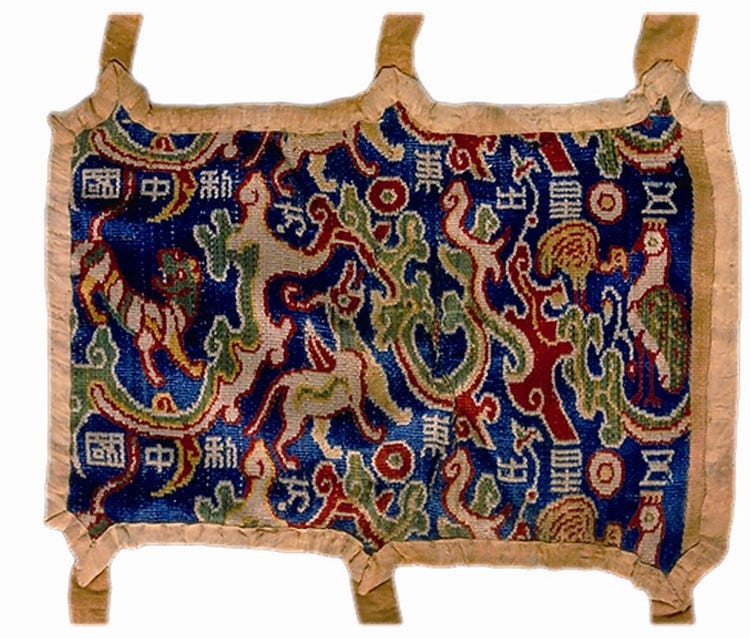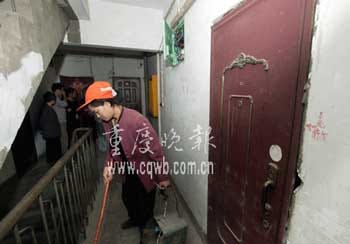The Factory Girl at Unit 4-4
The diary entries of a textile worker in Chongqing whose death by starvation in her factory flat was not discovered for five years.
*

*
*
Five Stars Over China Foretold
One of the most enduring White man’s lies is of European industrial ingenuity. Britain’s “industrial revolution” in particular was said to have birthed the mechanization of production, beginning with the 1785 Edmund Cartwright patented, automatically powered loom. Mechanization lead in turn to mass production of finished goods, starting with textiles and fabrics that enabled Britain to advance in technological sophistication, to export goods and so get rich via its colonial occupation of a third of the world.
In the image above is of a piece of an armband made of fibre some 2,200 years ago. It was unearthed in 1995 in Xinjiang that did not, then and now, had a single knitting machine. The armband functions both to hold the cuffs of a Han-era soldier and as protection during hand to hand combat. A single battle could involve up to 100,000 soldiers, so 100,000 pairs would have to made available. Until metals were used, primarily copper, wrist guards were made of thick, densely woven cotton, lined with silk so they slip in and tie easily and quickly, and for aesthetic appeal.
Stitched onto the piece were the script-words, 𠄡星出東方利中國. The line translates as “Five Stars Rise Over the East for Propitious Zhongguo” (or Central State / Middle Kingdom). China is today written in the original as 中國 zhongguo so the line actually presaged the present PRC five-star flag.
That wrist guard was found wrapped in the right hand of the skeletal remains of a local garrison commander who doubled as chief administrator of Jingjue 精絕, today named Minfeng 民丰县 on the southern route of the Silk Road in Xinjiang. Inside his coffin were some 300 identical pieces, that is, enough for 150 troops. The Silk Road portion around Jingjue was then patrolled round the clock by 500 soldiers, supported in turn by 3,350 individuals, including family members and Han officials (according to the official statistics published in the hanshu 漢書, completed around 50 CE).
Jingjue to Chang’an, today Xi’an, is 3,667 km on a straight line horse back ride, says the hanshu. There is another 3,000 km from Xi’an to Chengdu, a center of silk and cotton textile production, then and today.
In Chengdu a few years after the Minfeng find (also known as Niya cemetery ruins), several Han-era looms were unearthed. One was totally intact. Once cleaned up, the timber joints put back in their places then put to use in 2015, it produced the same wrist guard.
That means, 2,000 years before the Cartwright loom, Chengdu, 7,000 km away had mass produced for Han soldiers not only for the Xinjiang garrison town but very likely for the Han standing army that at peak was 1.2 million. Extrapolate that production volume of finished fabrics to the Han-era national population, of some 40 million according to Han census. On that scale, it would make look like Britain’s industrial revolution 2,000 years later was a Chengdu back alley cottage industry.
There’s no such thing as a “China rise.” It presumes the Chinese came out of nothing to overtake the West and to become the world’s biggest industrial manufacturer.
Before barbarians rode in from the West with their triumphant claims of “free” markets and capitalism, Song-era officials documented thousands of state-owned enterprises. That is, the government created supply and demand, and ran markets for profit because corporate and individual sources of tax revenues were limited and minimal.
So, acting like it were a private conglomerate, the 300-year-long Song government ran some 30 city river and sea port functions from Chengdu (today one part called Chongqing) to Fuzhou, from Liaoning to Guangdong. They operated shipping companies, produced and supplied ink and other raw materials for mass production of paper, porcelain wares, textile cloth and fabrics, mined and minted silver and gold coins to use as currency for bulk trade with as faraway Java and Palembang, both in present-day Indonesia. From Afghanistan, lazurite crystals were imported to make blue dyes. From Indonesia spices and plant materials produced perfume and sold as cooking ingredients, flavors and condiments. Restaurants today are taken for granted but was a service concept only the Chinese could invent to sell quick cooked food to large crowds of strangers organized around many tables and chairs at specific locations along highways, inns, open air markets and the like.
China is not rising. The Chinese have no match, by any nation, anywhere in the world. China is instead resurgent, returning to its glorious, innovative, hyper-active and prosperous days of the Tang, Song and Ming eras. The only question the Chinese are left to wonder is, which one.
China’s resurgence and restoration arose not simply from State planning, such as the Third Plenum.
Those kinds of grandiose plotting would be pointless, meaningless and impossible to materialize without the countless Chinese individuals tucked away among hundreds of millions in the labyrinth of Chinese society.
Consequently, it is these individuals, always and without exception, who pay the price for reform changes — with their lives. Whether alive or dead, the lives of these people are unseen, unwritten, unread and never heard of in the copy and paste stenographic output of the (Anglophile) Press and media stenographers of power and influence.
*
Behind the Door at Unit 4-4

*
*

Two thousand years ago Zhang Suyu 张苏玉 could just as well knit armbands for soldiers of the Jingjue garrson in Xinjiang.
Instead, her work until some 20 years ago at Chongqing No. 2 Knitting Factory 重庆第二针织厂 at Baihelin, Sha District went to the local garment market, if not then for export. She lived not far, at one of those hundreds of factory housing complexes, address Unit 4-4, Building 5, No. 2, Baiheling Bridgehead, Shapingba, Chongqing.
The details were never told, if at all any, but something happened at No. 2 Factory in or around 1997. One account suggested it had to do with a certain property transaction, and so the factory was turned over to a real estate developer. This meant that production would stop at the location but whether it would resume elsewhere, if at all, nobody knew and nobody was told. The factory is today gone.
Whatever the events, they prompted Zhang to choose one of a few layoff options. She chose early retirement, leaving in 1997 with a final severance pay of 4,000 yuan. That was the end of the matter until eight years later. It was an October day 2005.
The following translated passages are reproduced from the Chengdu Evening News, reporting at the time in 2005 and since archived here. There were other news report of the same matter at the Chongqing Evening News. (Or see this account that came years later.) But it’s the Chengdu version that’s worth repeating in the English if for nothing else then its Hemingway concision, straight and unadulterated reportage style:
“At about 11 in the morning, locksmith Tang Bo had a commission to open the door lock of Unit 4-4, Building 5, No. 2, Baiheling Bridgehead, Shapingba, Chongqing. The door of Unit 4-4 was of an old-fashioned anti-theft lock, easily pried open. Very quickly, he opened the door and stepped in. It was empty, no TV, just a radio, everything covered in dust. I’ts been a long time since anyone lived here, Tang thought. Across the room, he came to the bed and, at that instant, felt his body quiver then shook violently. Stretched on the bed was a single human skeleton.
He ran out, bumping into the man who had commissioned him to open the door. …
The police [from the Yuzhou Road Police Station and and the Sha District Criminal Police Detachment] arrived to find the skeleton laid flat on its back, right arm raised next to the head, left arm on the abdomen. The clothes over the skeleton look tidy, even neatly buttoned. Bedding included a pillow and a quilt, all covered in dust, fly pupae, dead maggots, and mouse footprints. Police investigations determined the room was last occupied by Zhang Suyu, a former employee of the Chongqing No. 2 Knitting Factory. Forensics put a likely date of death to August 8, 2000.Further investigations concluded no signs of break-in nor indications of violence or body injuries in the way of bone fractures. In the room, was a bottle of gentian violet but no drugs. In the closet were two shoulder bags, which appeared as they were when placed there. In a small box, some earrings and a little costume jewelry.
No traces of food were in the kitchen and refrigerator. There were a number of hospital medical records and test reports, though. All of which suggest, the deceased prior to death was destitute and in poor health.Above the skull were three photo albums. In them were mostly photos of a beautiful woman alone or with her family. Next to the pillow was a diary, with entries dated from 1993 to July 2000. Some pages recorded amounts of expenses, such as hospital visits and shopping. The last written page of the diary had no date. It read:
‘I haven't eaten meat for a month. How I wish for double-cooked braised pork... These have been my most difficult days...’ [一个月没吃肉了,好 想吃回锅肉、烧白… 这是我最难熬的一段日子…]”
*

*
*
The Diary of 张苏玉 Zhang Suyu
Like Chan Yin-lam 陳彥霖 of Hong Kong, Zhang Suyu was also one of us: Yin-lam at age 15, dead September 2019 because of the pro-US rioters and their local Chinese political and business tycoon backers; Suyu, age 36, native Henan, born 1964, dead after being laid off in 1997.
It was amid the tumult of reforms that Zhang Suyu died — and this is the big-picture, political context rather than her uncharacteristic, un-Chinese family life or because of her ex-husband living with their only daughter still in elementary school.
Alone behind the door of flat Unit 4-4, Zhang Suyu recorded not just her own thoughts but reflected on the tumultuous, personal effects of economic reforms in the first two decades, 1980-1997. Her reflections are naturally bias but the reforms bore real life consequences, in no part contributing to the turmoil in her life.
It’s only that the turmoil never reveals itself, in public much less, because of Chinese ethical upbringing. Hence, the wrath of reforms are unrecorded, unheard of, unnoticed and unseen.
Reading however Zhang’s diary entries, one is able to see beyond the statistics and news reporting about China’s reforms in especially CGTN and Global Times. CGTN reports, for example, might be totally factual and stenographic in their quality but to simply regurgitate, say, GDP per capita changes and lifting 800 million out of abject poverty say nothing else. Worse than that, they lie in any representation of the truth.
To memorialize the 24th Year of her death, August 8, it is reproduced below an assemble of entries (cited here) from Zhang’s diary: Let this serve as her memorial and a reminder to comrades at the Communist Party of China far and near.
The entries have been edited in its English translation but are arranged in no particular date order, each one separated by “…”
“A month ago, I bought the last small pocket of rice with the last 10 yuan I got from selling furniture. Then, I knew my end was coming. Now, where should I go from here? A week ago, I ate the last thing that there was, got dressed, lay on the bed to wait for the day to arrive. …
“Back then when starting to work, I thought that socialist China would never abandon its workers. Who would have guessed that Reform meant layoffs. If I were laid off, I thought, it is only because this is a socialist country. [But] how can the Communist Party abandon our workers? It has dawned on me what it means to see reality smash illusions into pieces! Liars deceive, singing songs of “Good morning! Reform! Open up!” …
“I have regrets. I regret not listening to Chairman Mao. Regret not seeing what it means to fight the bourgeoisie to the end; regret not seeing through the bourgeoisie deceit. I actually thought they were engaged in socialism, and they will never let restore capitalism in China. …
“How I really hate it. How I hate the rich who can be so vicious and cruel and unkind and they can bully the weak. All the while they invoke Chairman Mao. How shall we settle accounts, retaliate and continue the revolution? There have been millions laid off, now unemployed, tasting the suffering to be oppressed and exploited! …
“We are all humans after all, with self-esteem. But to be shamelessly bullied and humiliated and to live this humiliation? Why if they have meat to eat, they won’t even spare us laid-off workers a sip of soup?…
“The situation is so cold, terrifying, cruel and nasty, people can't breathe. Those naked money transactions, they scare me: the humiliation, living like a pig and a dog. Should I just go quietly? But, in the depravity, what choice do I have? …
“I can't do anything else except to spin and weave clothes. This is all that I can endure and only endure. But it’s become unbearable. …
“I am a woman of socialist China! Aren't all women liberated? The people who insult us, don't they have mothers and sisters? If only Chairman Mao were here, nobody would be so bold, arrogant and shameless. …
“I am a woman textile worker of socialist China, a leading textile worker, a member of the Chinese working class, residing in a socialist China. Yet here I’m starving to death on a simple bed. Thank you! Thank you for your Reforms, your Reform designs that conspire the bureaucracy and capitalists against workers. …
“I, I am about to die, I am about to leave this world created on the blood and sweat of our people. …
“I'm going to join the revolutionary martyrs. In that next life, I will invite the old man [Mao Zedong] and the martyrs to return to this world so we may restore justice. …
“Goodbye forever, my sisters and brothers! You might have long forgotten the young and lively girl on the knitting floor [Ed: on the factory floor, Zhang was given the nickname ‘factory flower’]. But I will always remember and love you! Goodbye forever, this age of beasts. I am going to 九泉 [jiuquan, literally ‘nine springs’, it refers to a Chinese mythological under world that hears the grievances of the present] to lay out my complaints. At jiuquan, I want answers: why deceive the working class? Why restore capitalism? Why permit workers to suffer hardships two times over, and that’s over the sins of others? I will accuse those corrupt officials, their greed, shamelessness and cruelty. This is my only wish. …
*
陳彥霖,张苏玉记忆
*






